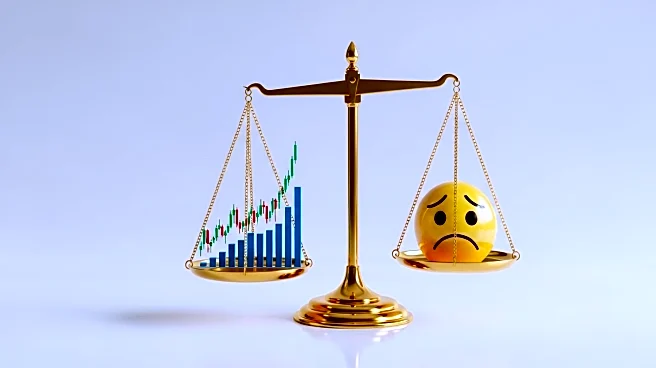What is the story about?
What's Happening?
Americans have reached a new milestone in stock ownership, with 45% of household financial assets now invested in stocks, according to Federal Reserve data. This record level of stock holdings is attributed to the market's recent highs and increased participation in retirement plans like 401(k)s. While this trend allows more Americans to benefit from corporate gains, it also exposes them to potential market downturns. Economists warn that the current high level of stock ownership could lead to significant economic impacts if the market experiences a slump. The S&P 500 has seen a 33% rally since April, driven largely by the performance of major tech companies, but this concentration also increases vulnerability to market shifts.
Why It's Important?
The increased stock ownership among U.S. households signifies a shift in economic influence, where market fluctuations can have broader impacts on the economy. This trend highlights a growing economic divide, as wealthier Americans benefit more from stock market gains, while lower-income individuals face financial strain. The potential for a market downturn poses risks not only to personal finances but also to consumer spending, which is a key driver of economic growth. The concentration of stock market gains in a few large tech companies further exacerbates this risk, as any downturn in these stocks could have outsized effects on the overall market and economy.
What's Next?
Economists suggest that while the stock market may continue to rise in the short term, the high level of stock ownership is a red flag that warrants close monitoring. A potential market downturn could lead to reduced consumer spending, particularly among wealthier individuals who have been supporting economic growth. This scenario could exacerbate existing economic inequalities and lead to broader economic challenges. Stakeholders, including policymakers and financial analysts, will likely focus on strategies to mitigate these risks and ensure economic stability.
Beyond the Headlines
The current economic landscape reflects a 'K-shaped' recovery, where wealthier individuals continue to prosper while lower-income Americans struggle. This disparity is partly due to the stock market's role in wealth accumulation, highlighting the need for policies that address economic inequality. Additionally, the reliance on a few major tech companies for market gains underscores the importance of diversifying economic growth sources to reduce vulnerability to sector-specific downturns.














